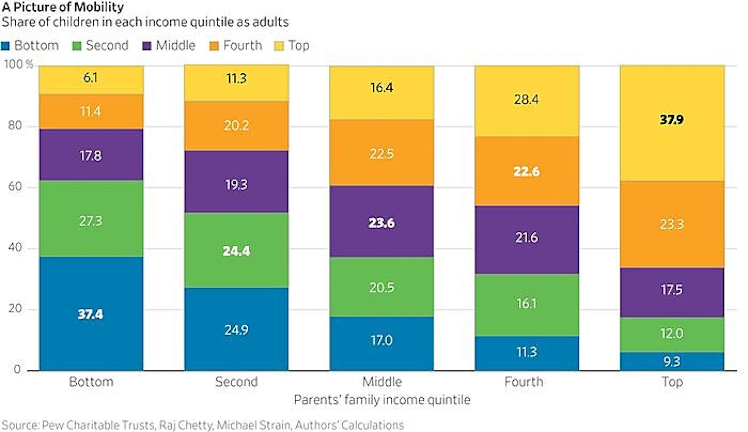Trending Assets
Top investors this month
Trending Assets
Top investors this month
A Short Essay on Upward Mobility
Oftentimes, I see inequality being mixed into the upward mobility conversation throughout the social sciences. Even though inequality in the US started widening in 1971, it's important to note that upward mobility is also a major theme in this country.
Pew Charitable Trust published a research paper on upward mobility in 2012. They found that:
- 84% of Americans have higher family incomes than their parents had at the same age, and across all levels of the income distribution
- 93% of Americans whose parents were at the bottom fifth of the income ladder and 88% of those whose parents were in the middle quintile exceed their parents’ family income as adults
All of these amounts are adjusted for inflation.
Interestingly, the paper noted that the percentage of adult children who grow up to live in a household in the same income quintile as their parents are surprisingly small. As the Cato Institute summarizes:
"On average, 39% of those children as adults rose to a higher quintile and 37% fell to a lower one". Since the majority either stay in the same household income quintile or rose to a higher quintile, it speaks a lot that income mobility is still a big thing in American society.

Do the rich kids generally stay rich? Interestingly, not. As the Cato Institute notes:
"Of children reared in the top quintile, 62% fell to one of the lower quintiles, including more than 9% to the bottom quintile. A significant number of the children reared in the top quintile who stayed in the top quintile as adults had incomes far greater than their parents, but statistically they could not rise out of the top quintile."
Even if public schools are terrible, 63% of children who grew up in bottom quintile families rose to a higher quintile while 6.1% of them end up rising all the way to the top quintile. This speaks a lot for a society that thinks that formal education is the only way of obtaining upward mobility.
When taking a grander view of upward mobility, America’s real mobility is most visible over multiple generations. It's our parents that make sacrifices so that we can have the opportunities and education that they couldn't have. It's our parents that chose to invest more in us rather than splurge on themselves. This theme of parents sacrificing for their children is big when it comes to looking at how upward mobility happens.
From a long-term perspective, as long as upward mobility continues to be a big thing in America, we will be seeing the economy become:
- more efficient as people invest more in themselves
- bigger in terms of consumption as people have more disposable income to spend on things
- more innovative and entrepreneurial as people become willing to take on more risks
However, if managed improperly, upward mobility can create more inequality throughout society. Even though income mobility grew since 1971, inequality expanded at the same time. For those wondering why, consider these factors:
- The labor market changed from manufacturing-based to service-based, creating a decrease in the number of well-paying, middle-class jobs and an increase in low-paying, service-sector jobs. The end result is income stagnation for the overall economy.
- Globalization increased competition for jobs and wages, hurting those with less education and fewer skills.
- Declining union membership led to less negotiating power for workers
- Tax policies incentivized manufacturers to offshore their manufacturing operations (i.e. changes in the way depreciation and R&D spending is capitalized) and have also allowed those, who got wealthy through inheritance, to keep more of their family's wealth through lower estate taxes.
- Technological progress led to job displacement and wage stagnation
- Changes in the education landscape increased barriers to more economic opportunities.
Overall, upward mobility is a big part of the American economy. While the country has benefited from the growth in economic mobility, it has also seen the consequences of improper management of upward mobility.
I hope this short essay has given you a new perspective on upward mobility.
Cato Institute
Upward Mobility Is Alive and Well in America
Studies show the vast majority of adults have higher income than their parents did.
Already have an account?